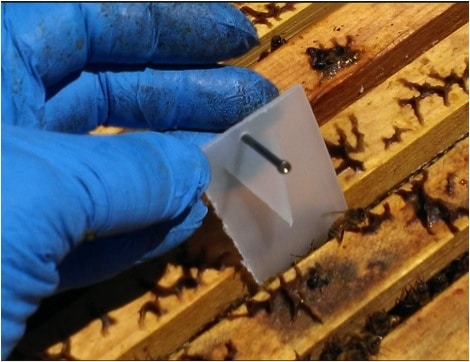Part of the appeal of keeping bees is to help get us out of our offices and away from florescent lights. As beekeepers, we start to notice rhythms other than the 9 to 5 commuters’ morning rush hour rhythms. We start to hear the music of our natural environment. Even in our large cities, nature speaks to us. Part of becoming a beekeeper is learning how to listen.
We see that different flowers bloom at different times and intervals. We notice the dandelions, the Bradford pears and the wild apples that are in full bloom as I write this. We look at trees; we notice the reddish tint of the maple and the soft green of the willow in bloom. We notice that our bees are bringing in different colors of pollen and wonder which plant is producing it. After a few years, we can put two and two together to start to figure this out. We start to see that nature’s calendar does not evolve around stagnant 365 annual units. Nature’s calendar starts with maple trees and crocus flowers, maybe even the pervasive skunk weed. Different blooms awaken from winter’s slumber at their own schedule ignoring the limits imposed by our atomic clocks.
In its essence, beekeeping falls securely within the farming and ranching family of activities. We manage livestock. As farmers and ranchers, we become attuned to the weather and our natural surroundings. Weather is the topic of polite conversation when no one knows what else to say. We talk about weather because we are really interested.
Beekeeping is a difficult activity. We have more problems than solutions. Many of us take the complexities of this passion and develop a deeper understanding, empathy, and appreciation of the problems of other farmers and ranchers. Their lives are also difficult with more problems than solutions. We face many of the same challenges and we share many of the same approaches to solving these “opportunities.”
Within this setting, beekeeping, at least to me, is about hands; farming hands; ranching hands. Beekeeping is no more a mental activity than growing corn or tomatoes is a mental activity. Hands know how to pull out a stubborn frame, how to grasp onto a queen, and how to scratch off a sting. Our hands move slowly and steadily. In our open hives, our hands react to the slightest change in the bee’s tempo. Our hands do lots of things that our minds are not even aware of. As our hands pass over the open frames, they instantly know to alter their altitude; their tempo; or their posture to the slightest variation in the pitch of the bee’s hum. Hands see and hear as well as fell. Hands are smart. My hands are mostly smarter than I am.
This is why I’m a big proponent of leaving the bee gloves in the truck. Gloved hands are awkward tools. They unknowingly squish and smash. The nuances of the hive cannot be heard by gloved hands. The bee’s music does not penetrate their fabric.
Hands do all kinds of stuff while we are beekeeping. Some work is fine and delicate such as gently nudging a frame back into its overstuffed super. Some hand work is about power. Hands lift full supers with just their fingertips. Hands are brave, too. We reach deep into the hive, between frames of bees to retrieve the hive tool, the queen cage or even the leaf that has fallen where it doesn’t belong.
It’s an odd combination, our hands and their agility, that allow us to show power and deft grace as we hoist a heavy super back into place on the hive, making sure the corners meet and ever so gently nudging bees off the edges so they are not smooched. Gloved hands, deaf and dumb hands, can’t do these things. How exactly do our hands, through the wood and the weight of a deep, feel the thin exoskeleton of a bee? I don’t know, but somehow hands know how to do this. They say that the fingertips are among the most sensitive parts of the body. Feeling through wood is quite a trick; intellectually impossible; but a trick our beekeepers’ hands understand.
Our hands learn and get smarter. Our optic nerves develop new pathways that avoid the confusion in our muddled brains. Our eyes communicate directly with our hands. Our ears do this too. Hands don’t need our brains to tell them where to hold an end bar full of crawling bees. Our eyes see the bees and our hands react accordingly without the interference of our brains.
Farming and ranching is hard work. It is physical work. Our hands develop muscles and dexterity. These aren’t the muscles of the body builder, just big for appearance. These are muscles developed from use and for use; like the forearms of the blacksmith. Don’t underestimate the hands and fingers of the seamstress. The power and refinement of those fingers show in the delicacy of the needlework, smooth precise stitching motions, exact and perfectly spaced. Those are strong hands. Ours are strong hands. Ours do dangerous work too. We get stung and risk even more stings. Our hands don’t wilt from their chores after a sting but redouble their efforts and improve their game.
Our hands get dirty because we are working with the earth and its creatures. Yes, we wash our hands with soap and water when we get home. We want to be as hygienic as our bees are. But some stains don’t wash off easily. I principally use pine needles in my smoker. The resin gets onto the sides of my hands. I’ll get propolis (which is similarly resinous) on my hands too. I like the stains that don’t wash off from a good scrubbing of soap and water. Our hands are working hands that are used outside of the cubicle’s synesthetic and sanitized environment. Stains are just the inevitable evidence of what we do.

